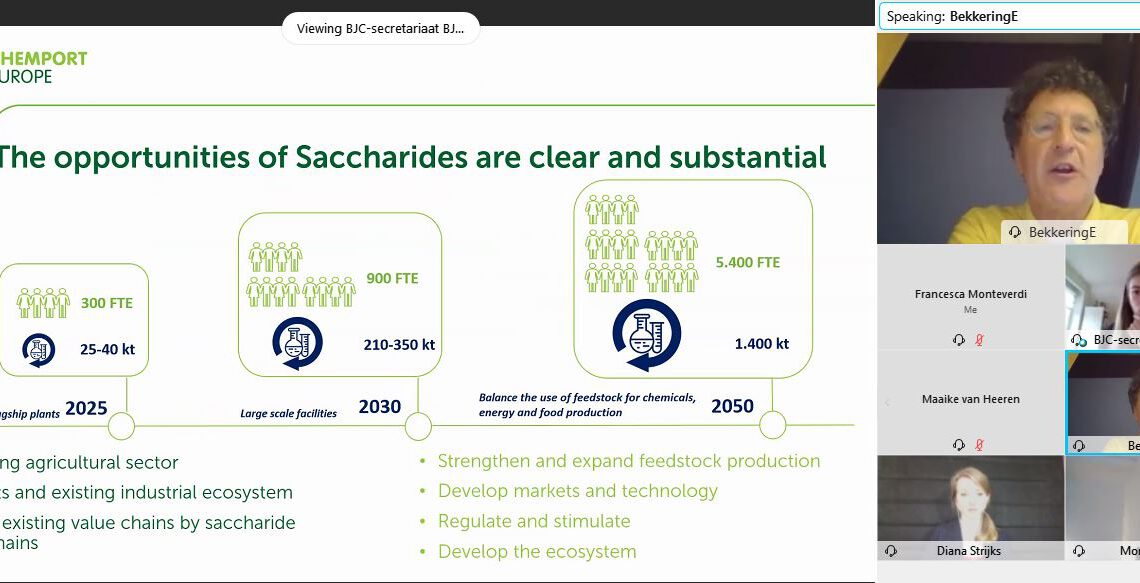28 January 2021 - Under the umbrella of the EU Industry Week 2021, the European Chemical Regions Network (ECRN), the Province of Groningen, and Chemport Europe organised the online event "Saccharide Agenda: the Future of the Biobased Chemical Industry".
Saccharides, like sugars, are versatile molecules that can be used as biobased alternatives to fossil raw materials to make chemicals and materials, such as bioplastics. Evaluation of typical saccharide-based value-chains by industry experts reveals unique opportunities to produce renewable intermediate chemicals and polymers from regionally available agricultural products and imported feedstock in the period up to 2050. The Chemport Europe Saccharide Agenda for Northen Netherlands offers a roadmap for the development of a green chemistry production chain in the Northern Netherlands over the next thirty years.
IJzebrand Rijzebol, Regional Minister of Economic Affairs, Province of Groningen and Member of ECRN, opened the webinar underlining how 2021 is a key year for reaching the Paris Agreement, according to the United Nations. With Europe setting its ambition to become climate neutral by 2050, Northern Netherlands is already on track to reach its climate goals, placing sustainability among the top policy priorities. The new policy initiative of ChemPort Europe, on the use of saccharide-based molecules to advance the green transition of Groningen largest chemical cluster, is among the initiative that the government is investing in to accelerate the Region's transition to climate neutrality.
Ms. Monika Banka, Network Coordinator of ECRN, outlined the possibilities that saccharide offers to the chemical industry and what support will need to accelerate the resource and energy transition of the chemical sector in Europe. Saccharide has multiple uses in different value chains and can be found in different kinds of feedstock, making it a versatile resource for the biobased chemical industry.
Mr. Errit Bekkering from Chemport Europe presented the Saccharide Agenda for Northern Netherlands, a new policy initiative aimed at strengthening the region’s agricultural sector, sustainability, and economic development. In the region, there is a huge potential for using sugars instead of fossil oil as a feedstock for the chemical industry. In the Chemport ecosystem, the entire chain from agriculture to organic base chemicals and intermediates to final products is present. Saccharides from sugar beets can serve both as biomass and renewable carbon and be used in multiple conversion processes (eg. to produce organic acids, alcohol, and polyesters). The Saccharide Agenda lays down a strategy that aims to reconvert the entire chemical value chain from fossil fuels to sugars, using the biobased expertise of its chemical clusters and research institutes. However, many steps are still needed to achieve the full transition, and the project is now in the pilot stage. For a real large scale switch to renewable carbon in chemistry, a joint effort is needed in R&D, development of market and technologies, incentives and regulations, as well as strengthening the feedstock production.
Mr. Bram Fetter from Cosun Beet Company provided an overview of the company and its ambition to become the greenest, most innovative, and most successful world’s sugar-beet processor. Since 1990, the company is working to minimize its carbon footprint and implement a circular economy model. By using all components of sugar beets, the company provides circular and biobased products such as food products, animal feed, protein from sugar beet leaves, biobased household products, ingredients for cosmetics, and green energy. The company contributed to the Noord4Bio study in 2015 and it is now working together with the Province of Groningen and ChemportEurope to accelerate the implementation of the Saccharide Agenda.
Another company working on the Saccharide Agenda for Northen Netherlands is Avantium. Mr. Ed de Jong presented the company's goal to lead the transition of the chemical industry towards the use of renewable chemicals and polymers by developing breakthrough technologies to make sustainable, plant-based products able to compete on performance and costs and by commercializing these technologies in partnership with industrial companies. Mr. Jong explained the process leading to the production of one of Avatium, biobased product PEF, a sustainable alternative to PET. The PEF is a lighter and longer-lasting material compared to PET and it is produced using 100% renewable material and it is fully recyclable. Thanks to this and other innovative solutions, Avantium aims to apply fully circular and biobased solutions to trigger a change in the packaging industry.
When it comes to doubts about the use of food crops to make chemicals, as far as saccharides are concerned there is nothing to worry about, according to Mr.Bekkering. There has been a sugar surplus since the European quota was lifted in 2017 and prices on the world market have plummeted. New value chains around sugar are therefore interesting for both chemistry and agriculture.



